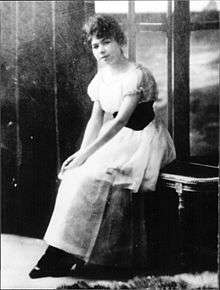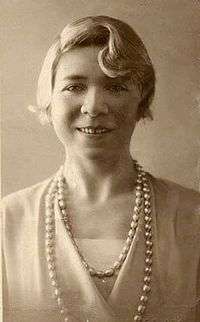Alfonsina Storni
| Alfonsina Storni | |
|---|---|
|
Alfonsina Storni | |
| Born |
May 29, 1892 Sala Capriasca, Switzerland |
| Died |
October 25, 1938 (aged 46) Mar del Plata, Argentina |
| Resting place |
La Chacarita Cemetery 34°35′27″S 58°27′35″W / 34.590833°S 58.459722°W |
| Nationality | Argentine |
| Literary movement | Modernism |
| Notable works |
La inquietud del rosal ("The Restlessness of the Rose") El dulce daño ("Sweet injury") |
|
| |
| Signature |
 |
Alfonsina Storni (May 29, 1892 – October 25, 1938) was one of the most important Argentine and Latin-American poets of the modernist period.[1]
Life
Storni was born in Sala Capriasca, Switzerland, to Italian-Swiss parents. Before her birth, her father had started a brewery in the city of San Juan, Argentina, producing beer and soda. In 1891, following the advice of a doctor, he returned with his wife to Switzerland, where Alfonsina was born the following year and lived until she was four years old. In 1896 the family returned to San Juan, and a few years later, in 1901, moved to Rosario. There her father opened a tavern, where Storni worked doing a variety of chores.
In 1907, she joined a traveling theatre company which took her around the country. With them she performed in Henrik Ibsen's Spectres, Benito Pérez Galdós's La loca de la casa, and Florencio Sánchez's Los muertos.
In 1908, Storni returned to live with her mother, who had remarried and was living in Bustinza. After a year there, Storni went to Coronda, where she undertook studies that would lead to employment as a rural primary schoolteacher. During this period she also started working for the local magazines Mundo Rosarino and Monos y Monadas, as well as the prestigious Mundo Argentino.
In 1912 she moved to Buenos Aires, seeking the anonymity afforded by a big city. The following year her son Alejandro was born, the illegitimate child of a journalist in Coronda. Sustaining herself with teaching and newspaper journalism, she lived in Buenos Aires where the social and economical difficulties faced by Argentina's growing middle classes were inspiring an emerging body of women's rights activists. [2]

In spite of economic difficulties, she published La inquietud del rosal in 1916, and later started writing for the magazine Caras y Caretas while working as a cashier in a shop.
Storni soon became acquainted with other writers, such as José Enrique Rodó and Amado Nervo, and established friendships with José Ingenieros and Manuel Ugarte.
Her economic situation improved, which allowed her to travel to Montevideo, Uruguay. There she met the poet Juana de Ibarbourou, as well as Horacio Quiroga, with whom she would become great friends. Her 1920 book Languidez received the first Municipal Poetry Prize and the second National Literature Prize.
She taught literature at the Escuela Normal de Lenguas Vivas, and she published Ocre. Her style now showed more realism than before, and a strongly feminist theme. Solitude and marginality began to affect her health, and worsening emotional problems forced her to leave her job as teacher.
Trips to Europe changed her writing by helping her to lose her former models, and reach a more dramatic lyricism, loaded with an erotic vehemence unknown in those days, and new feminist thoughts in Mundo de siete pozos (1934) and Mascarilla y trébol (1938).
A year and a half after her friend Quiroga committed suicide in 1937, and haunted by solitude and breast cancer, Storni sent her last poem, Voy a dormir ("I'm going to sleep") to La Nación newspaper in October 1938. Around 1:00 AM on Tuesday the 25th, Alfonsina left her room and headed towards the sea at La Perla beach in Mar del Plata, Argentina. Later that morning two workers found her body washed up on the beach. Although her biographers hold that she jumped into the water from a breakwater, popular legend is that she slowly walked out to sea until she drowned.[3]
Her death inspired Ariel Ramírez and Félix Luna to compose the song Alfonsina y el Mar ("Alfonsina and the Sea"), which has been performed by Mercedes Sosa, Tania Libertad, Danny Rivera, Nana Mouskouri, Mocedades, Shakira, Andrés Calamaro, Katia Cardenal, Avishai Cohen, Ane Brun, and many others.
Also, fifty years after her death, she inspired the Latin American artist Aquino to incorporate her image into many of his paintings.
Career
Alfonsina Storni was the winner of the First Municipal Poetry Prize and the second National Literature Prize for her book Languidez. Storni had several phases of writing over the course of her career: the first from 1916-1920, a second from 1925-1926, and a third from 1934 until her death in 1938.
In Storni's time, her work did not align itself with a particular movement or genre. It was not until the modernist and avant-garde movements began to fade that her work seemed to fit in. She was criticized for her atypical style, and she has been labeled most often as a postmodern writer although this label, too, is controversial.
Recurring themes in Storni's work include humanism, nature, alienation, death, family, sorrow, women's issues, and violence. One of her most well known poems, Tu Me Quieres Blanca challenged double standards and created a literary indictment against hegemonic male characters. Over time, her work developed strongly feminist themes and explored the collective concerns of women.
In 1919 alone Storni authored six short stories, two novels, and a series of essays. The publication of Languidez followed the next year, closing one period of writing and opening another. Five years later she authored Orce during a period of transition that shifted her tone of irony which would go on to characterize her following works.
Storni's early poetry received criticism for being immature and beginner, although these works are amongst the most well known and regarded. The eroticism and feminist themes in her writing have also received harsh criticism, but as time passed critics noted that her work matured and developed. After a nearly eight-year absence from the writing scene, she returned with two books, Mundo De Siete Pozos and Mascarill Y Trebol, that now mark the height of her poetic maturity.
Work

- 1916 La inquietud del rosal ("The Restlessness of the Rosebush")
- 1918 El dulce daño ("The Sweet Harm")
- 1919 Irremediablemente ("Irremediably")
- 1920 Languidez ("Languidness")
- 1925 Ocre ("Ochre")
- 1926 Poemas de amor ("Love poems")
- 1927 El amo del mundo: comedia en tres actos - play ("Master of the world: a comedy in three acts")
- 1932 Dos farsas pirotécnicas - play ("Two pyrotechnic farces")
- 1934 Mundo de siete pozos ("World of seven wells")
- 1938 Mascarilla y trébol ("Mask and trefoil")
Post mortem:
- 1938 Antología poética ("Poetic anthology")
- 1950 Teatro infantil ("Plays for children")
- 1968 Poesías completas ("Complete poetical works")
- 1998 Nosotras y la piel: selección de ensayos ("We (women) and the skin: selected essays")
References
- ↑ Salem Press (1 October 1999). Directory of Historical Figures. Salem Press. p. 604. ISBN 978-0-89356-334-9. Retrieved 28 October 2012.
- ↑ Bowen, Kate (10 November 2011). "Alfonsina Storni: The Poetess that Broke from the Pack". The Argentina Independent.
- ↑ "Alfonsina Storni". Encyclopædia Britannica. Retrieved 2 May 2009.
External links
- Alfonsina at the Cervantes Virtual Library (Spanish)
- Alfonsina by Agriela Deccicco (Spanish)
- Alfonsina, a 1957 film starring Amelia Bence (Spanish)
- Translation of Storni's poem Peso Ancestral (English)
